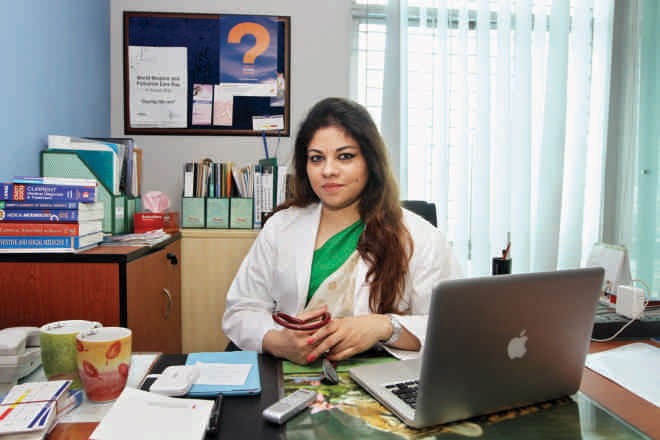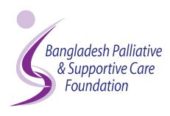The One Who Heals
Interview with Dr. Rumana Dowla
Amitava Kar
September 05, 2014
Dr. Rumana Dowla is the first certified and trained Palliative Care physician in the country. After completing her MBBS from the prestigious Lady Hardinge Medical College, New Delhi, Dr Rumana was awarded the Commonwealth Scholarship in 2008 to pursue a Masters in Palliative medicine from Cardiff University, UK. She has received numerous degrees and extensive training in Palliative medicine, children’s health, and leadership development in Singapore, UK, Australia and the US. Currently, Dr Rumana provides palliation to patients and their families through Bangladesh Palliative and Supportive Care Foundation (of which she is the founder Chairperson), at United Hospital and honorary service at BSMMU Hospital and National Institute of Cancer Research And Hospital (NICRH). She is a fellow, Pain Policy Studies Group, Wisconsin USA.

Dr Rumana Dowla, Photo: Prabir Das
What exactly is palliative medicine?
Palliative medicine looks at the patient as a whole. It is an approach that improves the quality of life of patients and their families facing problems associated with life-threatening illness, through the prevention and relief of suffering by means of early identification and impeccable assessment and treatment of pain and other problems that are multidimensional: physical, psychosocial and spiritual. Recent studies show that introducing palliative care along with curative care can improve longevity of patients with cancer. Palliation improves quality of life of the patient and family.
How?
It combines internal medicine with a holistic approach to taking care of an individual. In addition to physical pain, patients suffer a lot of other problems such as loss of independence, loss of health, loss of status and so on. Financial worries, impending loss of family and possession and ultimately the fear of the unknown add to their physical pain. With terminally ill patients, our goal is to help them accept the reality so that they can make plans and spend some quality time during the rest of their lives. We also counsel the family members to cope with the situation.
How do you tackle the spiritual pain?
That’s the hardest part. It’s unique to each individual. One of my patients was diagnosed with lung cancer. One day he said to me, “I have never harmed anyone. All my life I have tried to do the right thing. I don’t even smoke. Why did this happen to me?”
What did you tell him?
Sometimes we cannot explain why things happen to us. We need to accept it. Only then can we move on and make every moment meaningful and special.
Who can receive palliative care?
Cancer patients at every stage, elderly patients with dementia, end stage lung disease (COPD), end stage organ failure (heart, kidney, lung), Motor Neuron disease e.g. multiple sclerosis, ALS, end stage infective diseases (AIDS, TB), patients in ICU and other serious conditions.
What motivates you?
My grandmother had stomach cancer. Her pain was unbearable. I wanted to comfort her but did not know how. Later on this served as my motivation to relieve pain in others.
While working as a paediatrician at BSMMU, I saw that parents of children with cerebral palsy needed counselling and therapy. Then I did not know how to break the bad news. Now I know training in palliative care would have helped greatly. To explore further, I switched to Public Health where I became familiar with a more holistic approach to medicine. In 2005, a family friend, Brigadier General Suraiya Rahman, an obstetrician and gynaecologist recommended that I take up palliative medicine.
The concept of palliative medicine is rather new in our country. What challenges do you face?
We have come a long way since 2005. Now along with Centre for Palliative Care at BSMMU hospital, we have launched various programmes to promote palliative medicine at all levels. DMC has recently established a palliative care unit. BSMMU is going to offer MD in palliative medicine very soon. In the beginning, we had difficulty explaining the concept even to physicians. Now we are training doctors and nurses across the country. It should be included in the medical curriculum.
What needs to be done to advance palliative medicine in Bangladesh?
First of all, awareness must be raised among physicians, patients, family and other stakeholders. Training is essential. We need a National Palliative Care Policy and Guideline. The current Narcotics Control Act 1990 should be amended so that pain medication such as ‘immediate release morphine’ becomes available to patients in unbearable pain. Palliative care should be community based. It should be provided at patients’ home in the comfort of family and friends. This will prevent unnecessary financial loss to the family and reduce the cost of public health care. We are in dialogue with APHN (Asia Pacific Hospice Network) and BRAC Health to take palliative care to the grass-root level.
